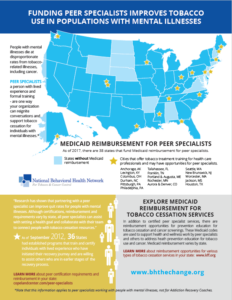Written by Dawn A. Randolph, MPA and Lea Simms
Have your organization’s tobacco cessation efforts been going up in smoke? Has it been difficult to engage your clients in quitting and staying tobacco free? There is great opportunity to leverage peers to enhance your tobacco cessation services.
For many, quitting smoking, or use of other tobacco products is daunting and can take many attempts to be successful. Research has shown that partnering with a trained peer who has lived experience can improve quit rates for people with mental illnesses and addiction. In addressing tobacco use, peers can encourage clients to quit, support them along their cessation journey, and become change agents that promote a non-smoking culture in mental health settings.
A few examples of roles a tobacco cessation peer might engage in include:
- Developing and facilitating a tobacco cessation group;
- Integrating tobacco cessation conversations into other established groups;
- Developing and leading alternative activities to replace smoking during regularly established breaks;
- Community engagement and outreach through education, conversations, and delivering presentations about tobacco cessation to individuals interested in quitting.
How do Peers Fit into your Payment Model?
It’s clinically effective to use peers to support your patient’s health and wellness goals, and using a peer health workforce to support tobacco cessation and cancer control efforts can make financial sense too! For almost two decades, Medicaid has recognized the effectiveness of peers and now there are 38 states (and counting!) who provide Medicaid reimbursement for peers in mental health settings. (Download the infographic Funding Peer Specialists Improves Tobacco Use in Populations with Mental Illnesses). 
So, how will your organization use peers to help your patients achieve their health and wellness goals? To help you get started, here are a few resources to help your executive, clinical, and financial teams to incorporate peers into your tobacco cessation and cancer control services.
Resources for your Executive Team
- View the archived webinar The Power of Peers for Tobacco and Cancer Control Practices to understand both the state Medicaid and peer health workforce perspectives.
- Track what’s happening in your state here and view state requirements for peer specialist certification, utilization and funding sources.
- Find out if your state provides Medicaid reimbursement for peers here (See map on the infographic).
- Integrate Peers into your strategic plan. To help make this a reality, use the process in the Strategic Business Decision Making course found at BHbusiness Plus.
Resources for your Clinical Team
- Join the National Behavioral Health Network for Tobacco Cessation and Cancer Control to gain free access to toolkits, trainings, and other resources focused on addressing tobacco and cancer disparities among the behavioral health population.
- Support your peers to attend Tobacco Treatment Training. You can find accredited training programs at the Council for Tobacco Treatment Training Programs. One program – the Florida State University Tobacco Treatment Specialist Program –places a particular emphasis on training peer specialists.
- Incorporate peers into your workflows by using Process Mapping, which you can learn more about at BHbusiness Plus.
Resources for your Financial Team
- View SAMHSA’s Review and Analysis of Funding Recovery Support Services and Policy Recommendations. State-specific examples are compiled in this report.
- Watch the training, Financing Peer Support Through Medicaid – Billing Codes and Other Factors. This webinar addresses expanding Certified Peer Specialist service codes and highlights the Whole Health Certified Peer Specialist model.
- Explore using the Health and Wellness Medicaid code (H0025) or other health and wellness funding mechanisms in your state to reimburse for services and programs by peer who support consumers in their tobacco cessation goals and cancer prevention services. To learn more about these financing options view the archived webinar The Power of Peers for Tobacco and Cancer Control Practices.
Other Related Resources
- Peers Helping Peers: Ways to Quit Tobacco with Rx for Change (Webinar)
- Peer Supports for Tobacco Cessation for Adults with Serious Mental Illness: A Review of the Literature
- A Systematic Review of Peer-Support Programs for Smoking Cessation in Disadvantaged Groups
Stay up to date by joining the National Behavioral Health Network for Tobacco and Cancer Control to gain access to resources to support your staff, consumers and community in reducing the use of tobacco and risk of cancer.
